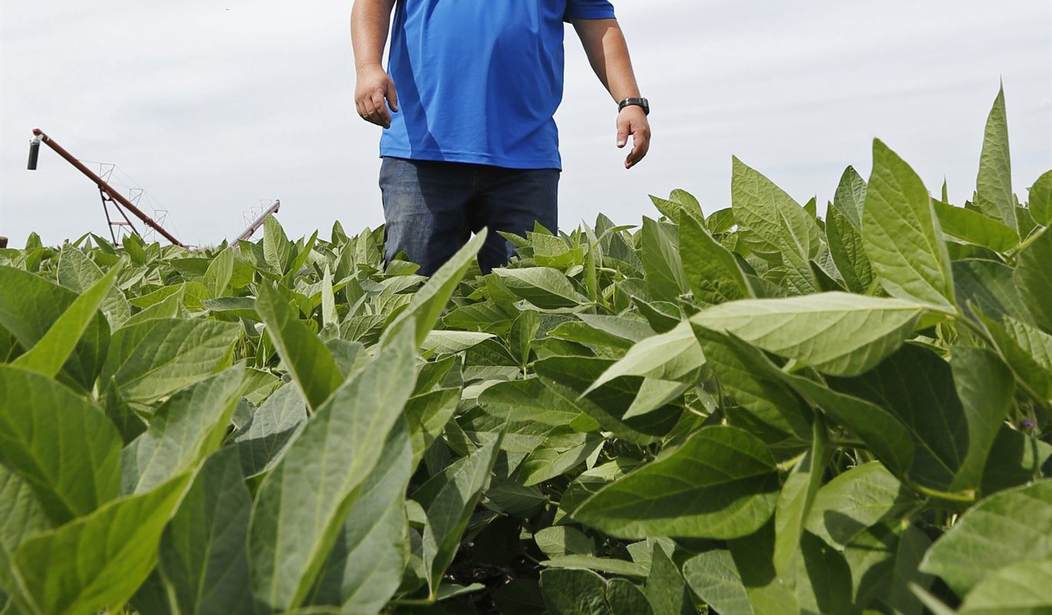As my U.S. Senatorial campaign moves across Pennsylvania, I’ve found myself speaking with mushroom farmers, turkey famers, feed manufacturers, fertilizer suppliers, those who store commodities, to those who transport those commodities. In speaking with these front-line workers, a couple of things have become abundantly clear: this inflation crisis is not “transitory,” the worst is yet to come, and our store shelves are not empty simply because Americans are doing so well that they’re buying too much stuff.
Over the past several days, I’ve seen one news commentator after another try to paint the narrative that the empty shelves we see at our local grocery store could actually be an indication that our economy is improving. That somehow, it’s a sign that our nation is racing back and that it’s up and running again. What’s more, we’re told that empty shelves could be a signal that the American people are doing so well and purchasing goods at such a rapid pace that producers simply can’t keep up. As a consequence of our haste to spend more and purchase too many goods, we’ve inadvertently put too much pressure on our supply chain that simply can’t keep up with our insatiable need to consume. Maybe if we could just wait a little longer as they work out the supply chain kinks, our shelves will be teeming over with produce once more. We’re being told that the only real significant interruptions we may experience is getting a large enough turkey for our Thanksgiving dinner or having to shop for Christmas a little bit earlier this year.
Admittedly, if you’re not directly speaking with those who actually grow the food, store the food, or negotiate futures contracts on crude oil, feed, or flour, these news commentators’ explanations may sound plausible. However, I’ve sat across the table from one of the largest dealers in commodities. I’ve spoken to a barn packed with farmers. I’ve walked a mushroom farm. I know better.
Recommended
At the beginning of the supply chain are those who grow the fertilizer to sell to the mushroom farmer, those who store the grain, and those who purchase the special chicken feed. You can’t get eggs at your local grocery store until the egg farmer sells it to them – and Mr. Egg Farmer can’t get his eggs to the stores if he can’t buy his special chicken feed from the feed manufacturer (who can’t make the special chicken feed without the grains from the wheat farmer). And on and on it goes. These are the fine people I have spent the past three months talking with and walking their facilities to get a better understanding of what is happening in our country.
In the state of Pennsylvania, agriculture is our number one industry. For example, roughly 65% of the nation’s mushrooms come from Pennsylvania – not China. Mushrooms are not on one of the ships floating around outside of New York’s port. What our growers are experiencing is nothing short of a new wave of problems that will sweep through every household in America.
Which leads me to my other point – we haven’t seen the worst of it yet. The increased input costs these growers, manufacturers, and storage keepers are experiencing are real, and as of now they have not been able to fully pass on these increased costs to the consumer. But, they will and soon. The overwhelming majority of these growers, purchasers, and manufacturers operate on futures contracts. For instance, if they believe current prices on crude oil are better today than they will be next year, then these astute businessmen and women will lock in today’s prices by entering a two- or three-year contract. Most of them have locked in cheaper energy prices until the end of this year. But these contracts are coming to an end and the new contracts they are entering into will be at a significantly higher price. So, although we are experiencing higher inflation today under the Biden Administration than we did under the previous one, today’s inflationary pressures do not reflect the real costs of doing business. Today’s prices are just the beginning. Today’s inflation, in part, reflects costs that were negotiated years earlier, as most producers purchase their energy source years in advance. Last year, those entering contracts to purchase crude oil in advance were paying on average $35 per barrel. Today, as producers go to enter into similar contracts for next year they are doing so at $83 per barrel. That’s a 137% increase. According to the latest Producer Price Index, not all of these costs are reflected in what consumers are paying at the cash register – yet.
Another wrinkle: salaries. Salaries are the largest expense at these facilities. Exacerbating this expense is the shortage in employees that has forced businesses operating on tight margins to now compete with the federal government incentivizing would-be employees to not work. One such facility owner said he pays his employees an extra $100 each pay period just to make sure they come into work. This added cost amounts to a six-figure total that he pays for out of his own pocket. Today, he’s not able to fully pass this cost on to the low-income mom trying to purchase a loaf of bread. But, he will...soon. Another owner shared that she just received a notification from the Biden Administration that her company no longer fits under the definition that allowed them to be grandfathered into a health care program of their choosing. Instead, she must now roll over into the Affordable Care Act, which increases the insurance she has traditionally paid in full for her employees by 35%. Today, she’s not fully able to pass these costs onto her farmers picking up their customized feed. But she will...soon or go out of business. I was told of a chicken farmer who produces 18 million eggs a day, whose input costs have increased to $1.20 per dozen while only being able to get stores to pay $1.00 per dozen...for now. But....soon.
Furthermore, the vaccine mandates are going to drive food prices up and create an ever-worsening food shortage. Employees who don't want to take the shot are going to quit and there will be less workers at the agricultural facilities that sort and package food to those who load and drive the trucks. Additionally, the hostile environment the Biden Administration has created for natural gas producers is having a negative impact on the fertilizer and spray materials businesses that remains to be felt and seen in our food supply. Fertilizer is manufactured from natural gas (methane). Natural gas is almost 3X as expensive this September as it was last year. The list of disruptions in our economy could go on and on. But, here is the point: Our problems run much deeper than being merely inconvenienced.
I scoff when I hear otherwise smart economists, Federal Reserve members, and news commentators speak of a “transitory” inflation that will fade away. We hope and pray that what goes up will eventually come down, but what kind of havoc will significantly higher inflation cause on those in the Middle Class and below? What kind of irreversible damage will be caused to our economy as a direct result of poor policies that are being forced upon our businesses and people? Americans don't think that famine can happen here in our country, but with what Biden has done it is entirely plausible.
From the federal government incentivizing people not to work, to the added worker shortage imposed by the forced vaccinations mandates, to the shutting down of the Keystone pipeline, to the analysis that is currently being done by the Biden Administration to shut down yet another pipeline (i.e., Line 5) in the midst of our current energy shortage, to ships floating at our nation’s major ports, to the flood of illegals across our borders, to the liberal spending of our Congress and Federal Reserves, to the unsustainable pressure being placed on our agriculture industry – all of these catastrophes have one thing in common: the Biden Administration. All these catastrophes have either been created or exacerbated by their inferior policy ideas and their inability to legislate in a way that strengthens our economy and our people. None of these catastrophes are acts of God. They are all man-made and have the ability to be corrected if we can get better men and women in positions of authority and fast.

























Join the conversation as a VIP Member